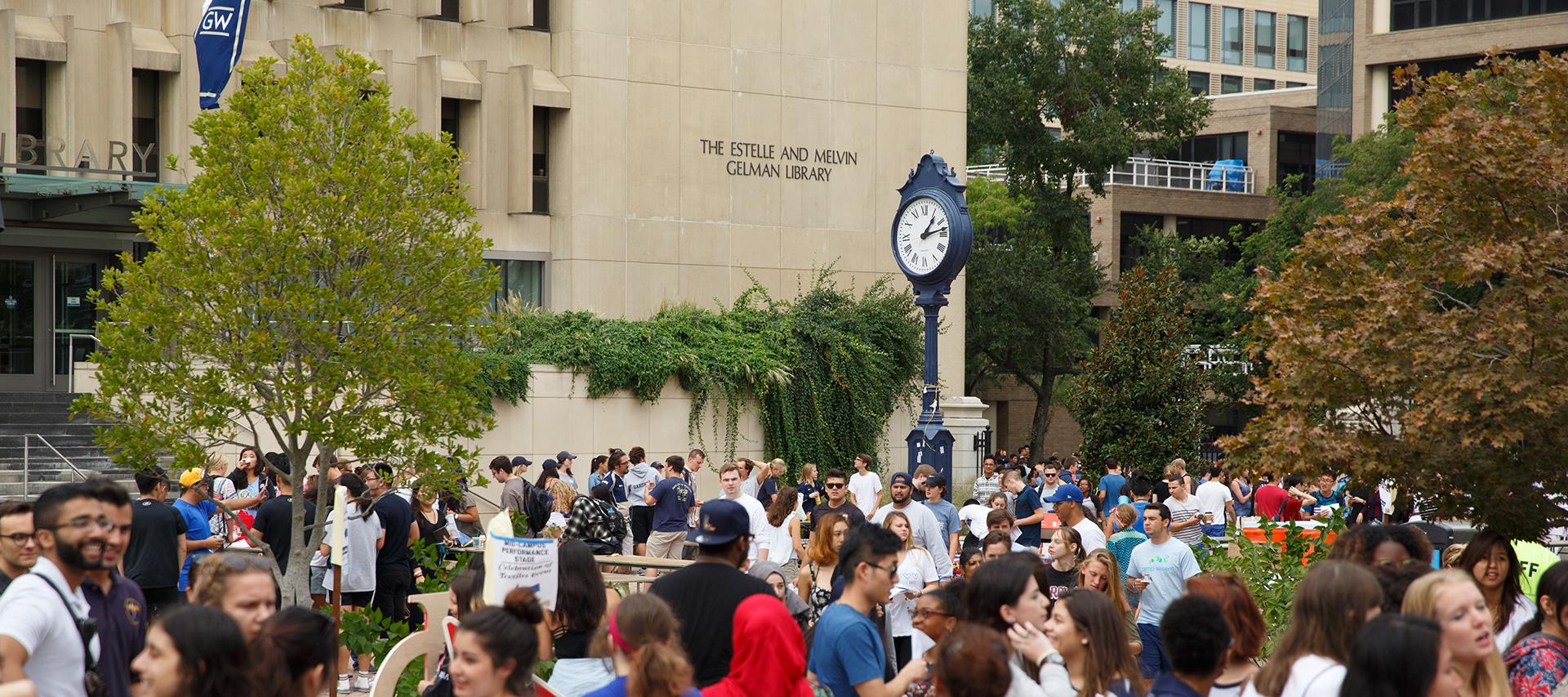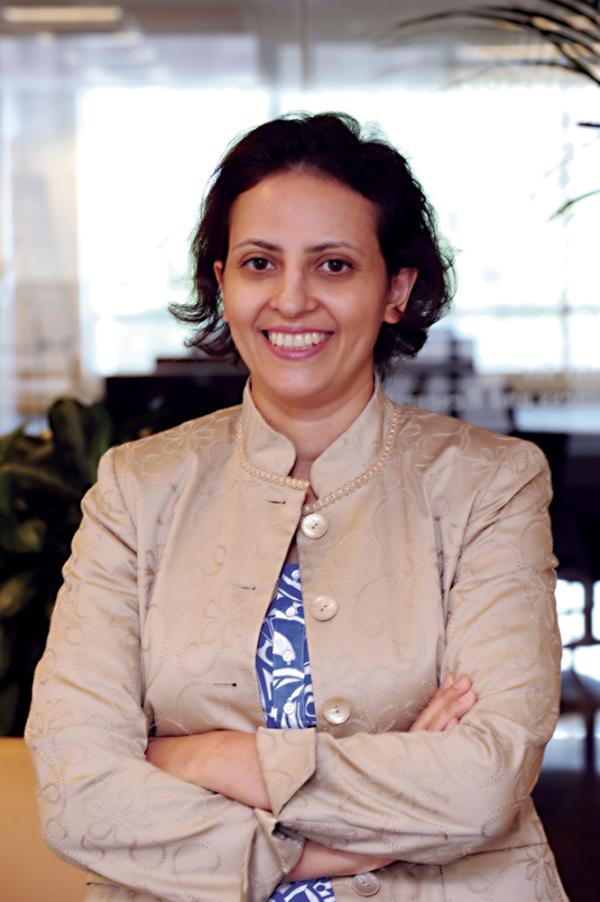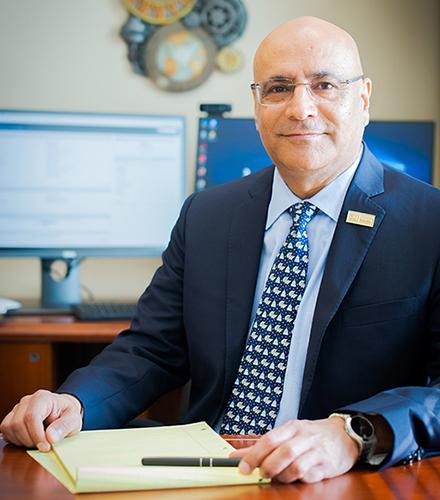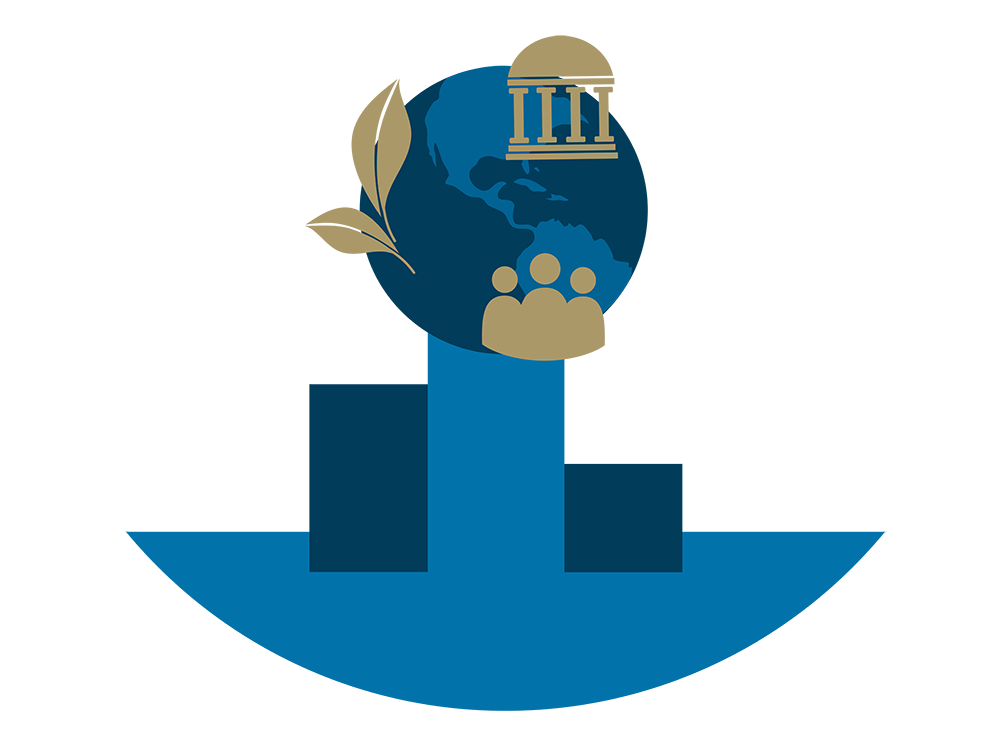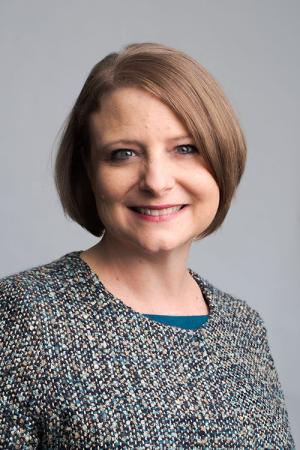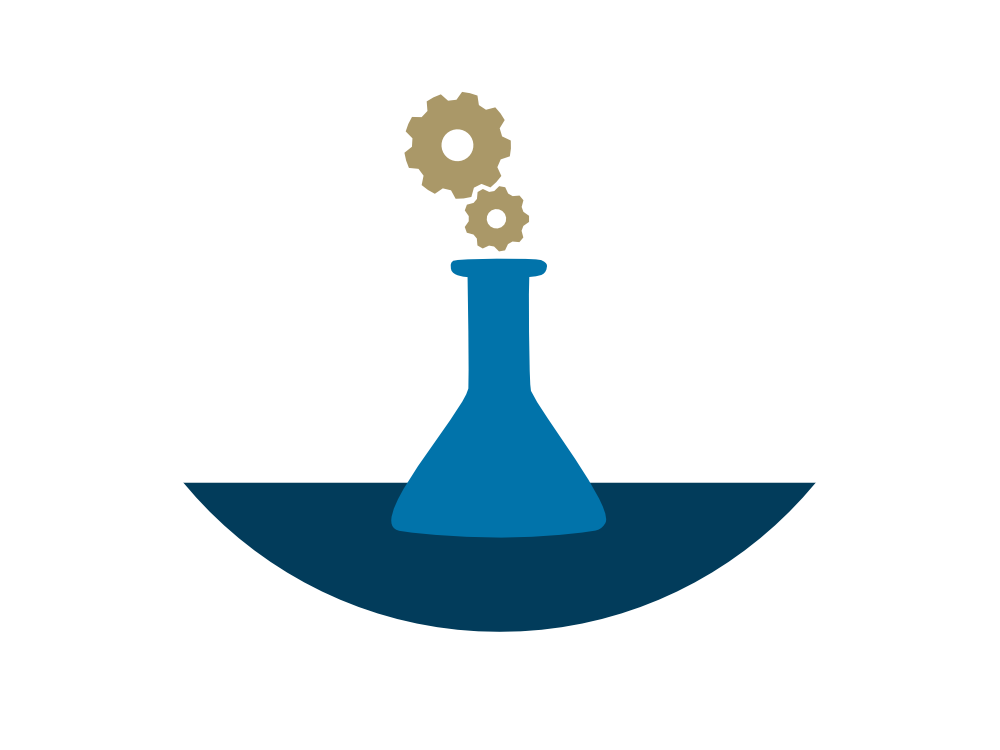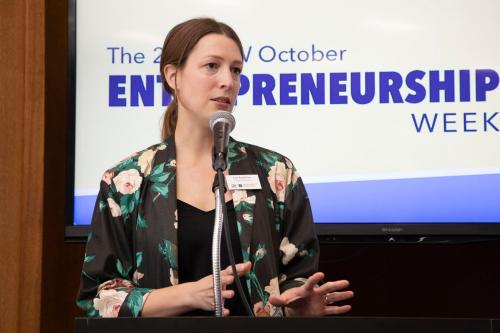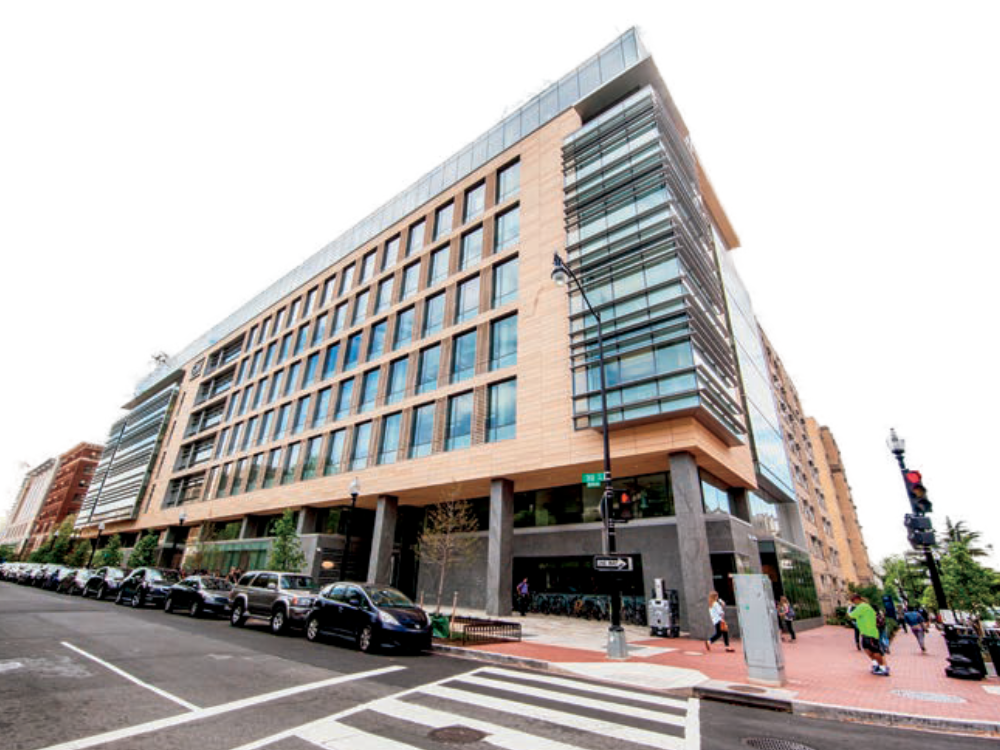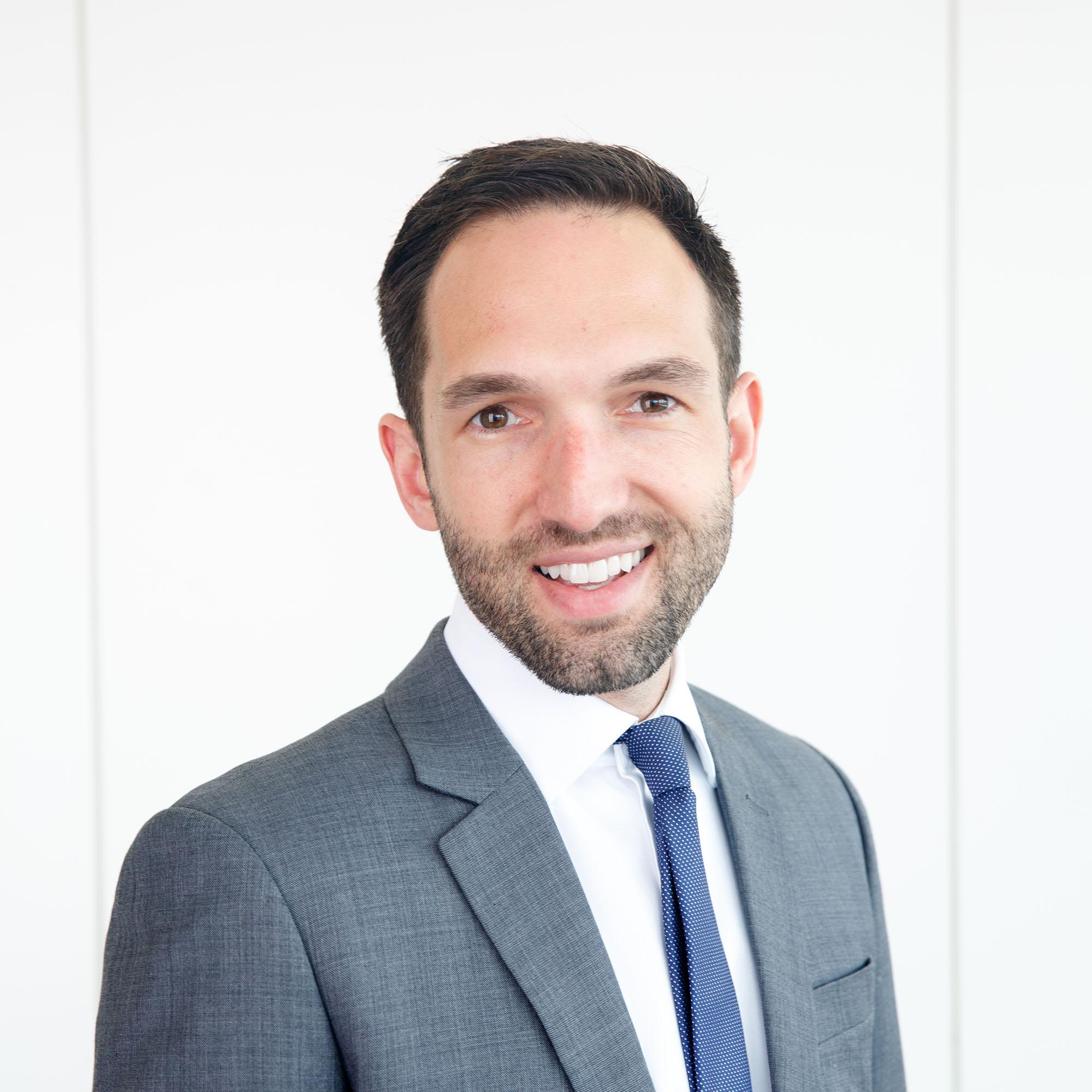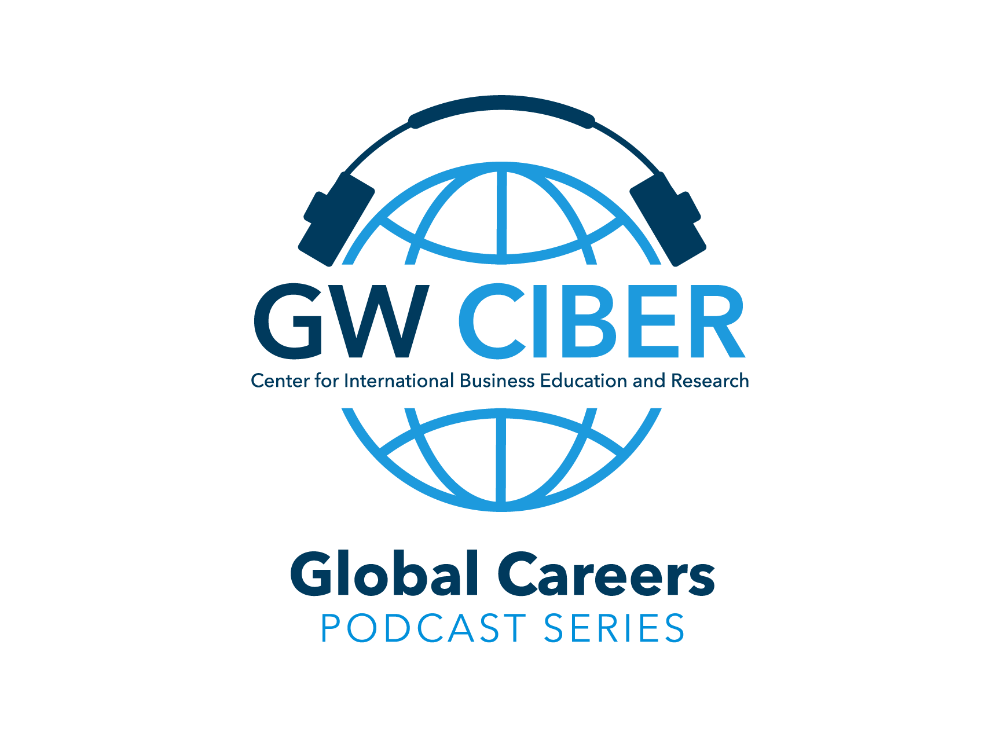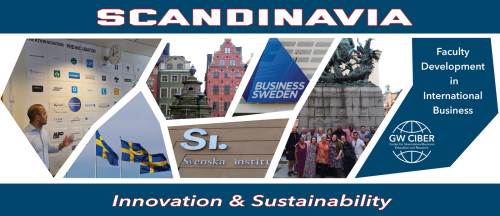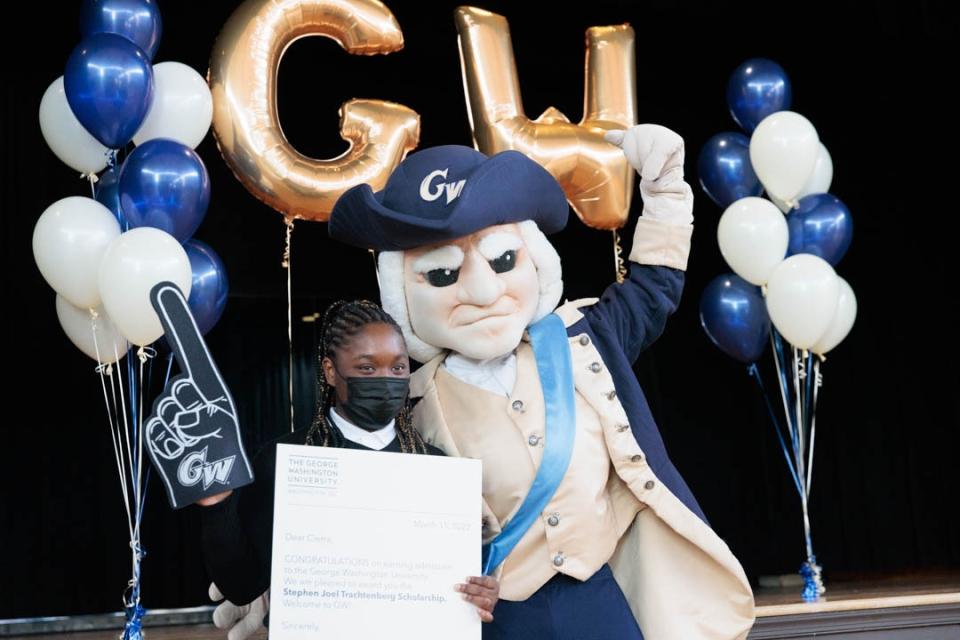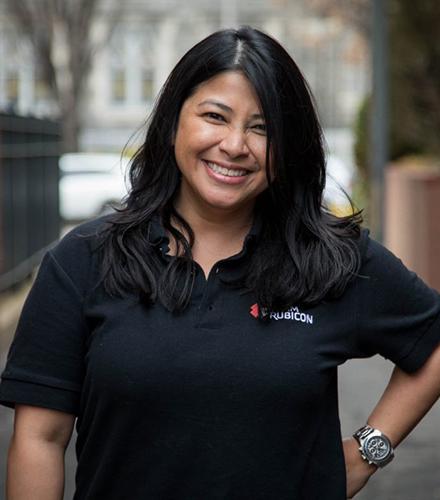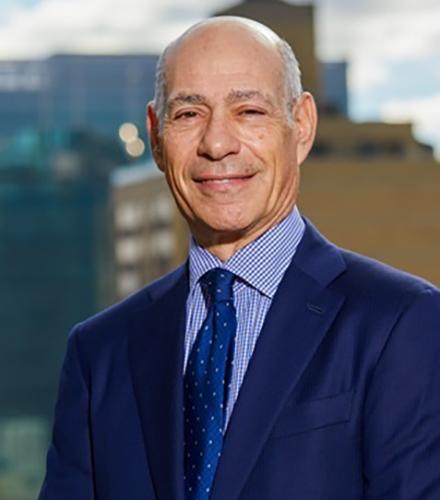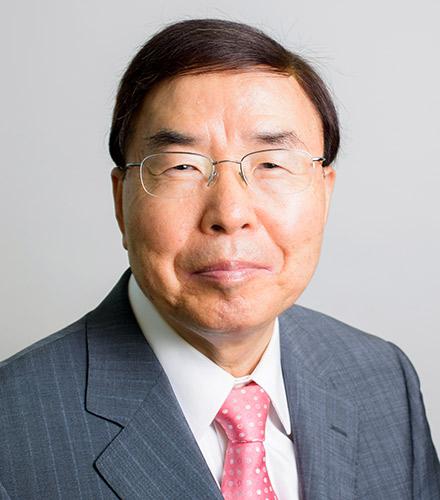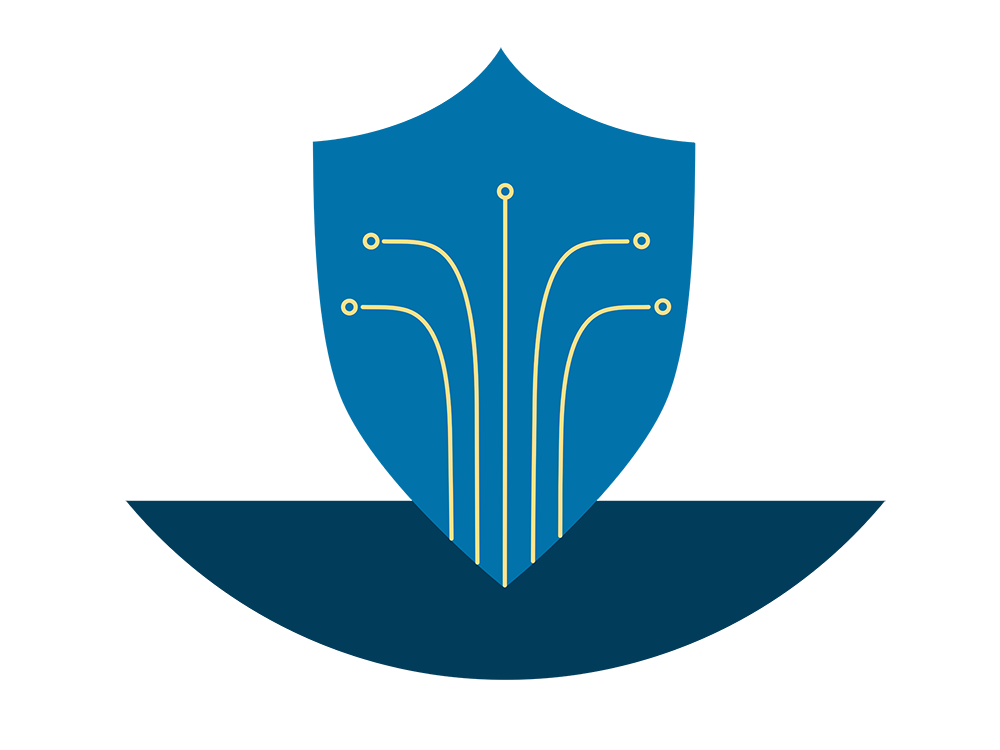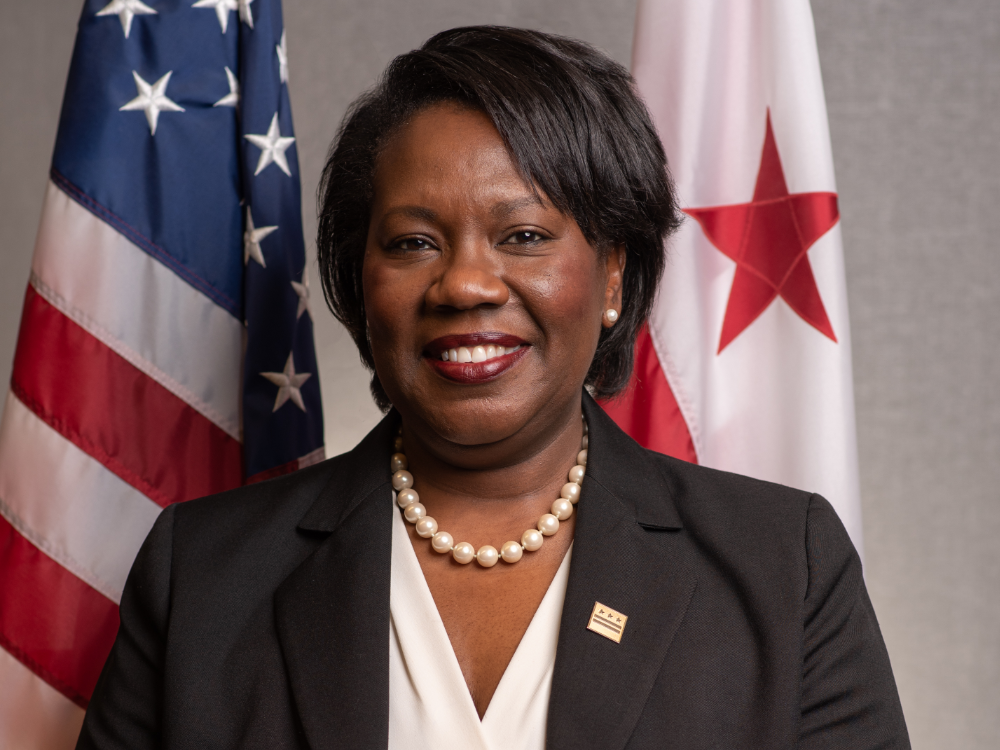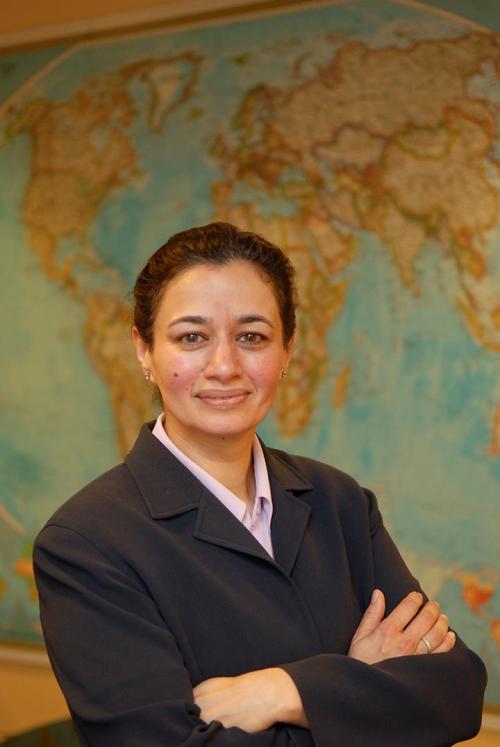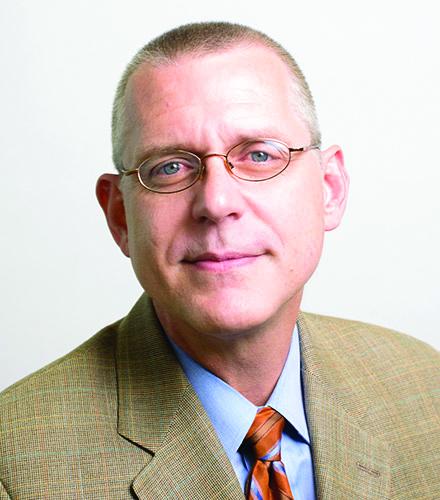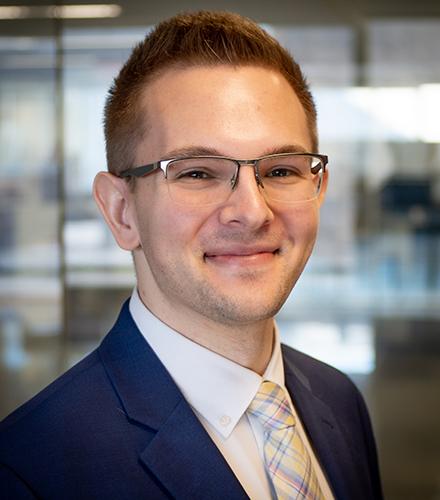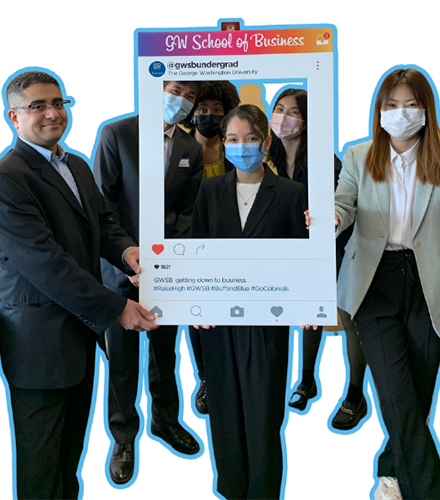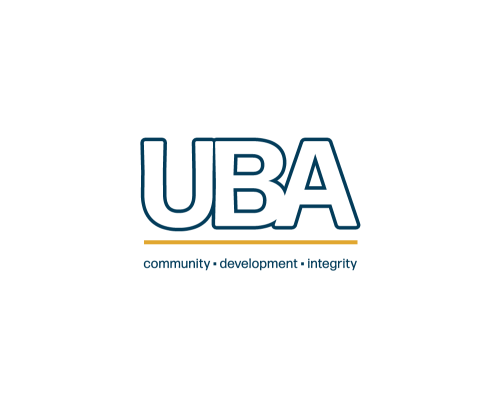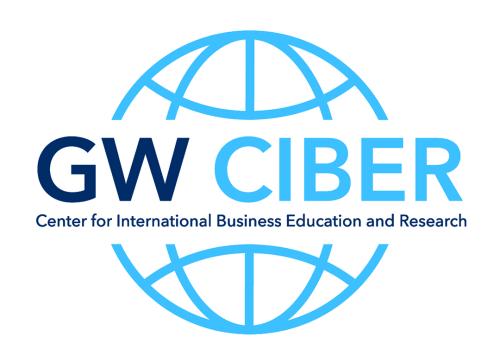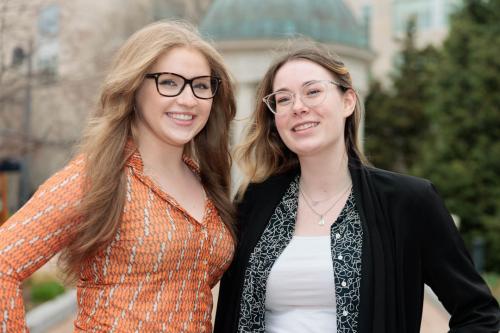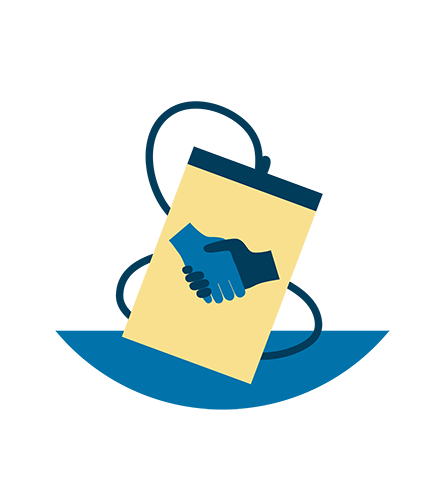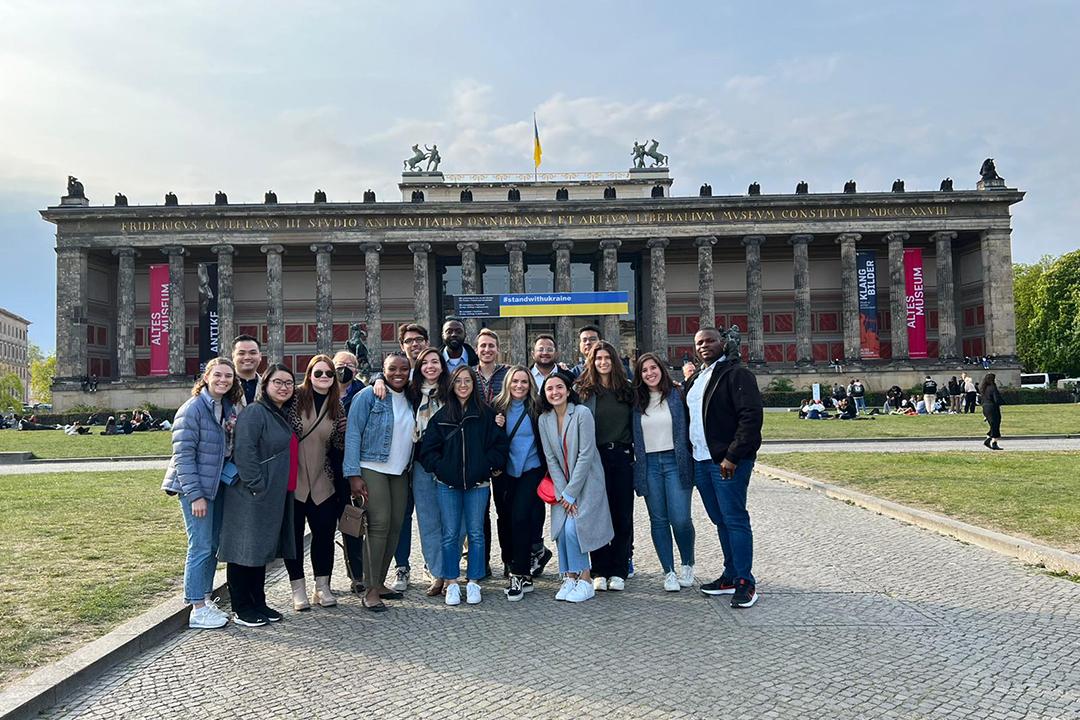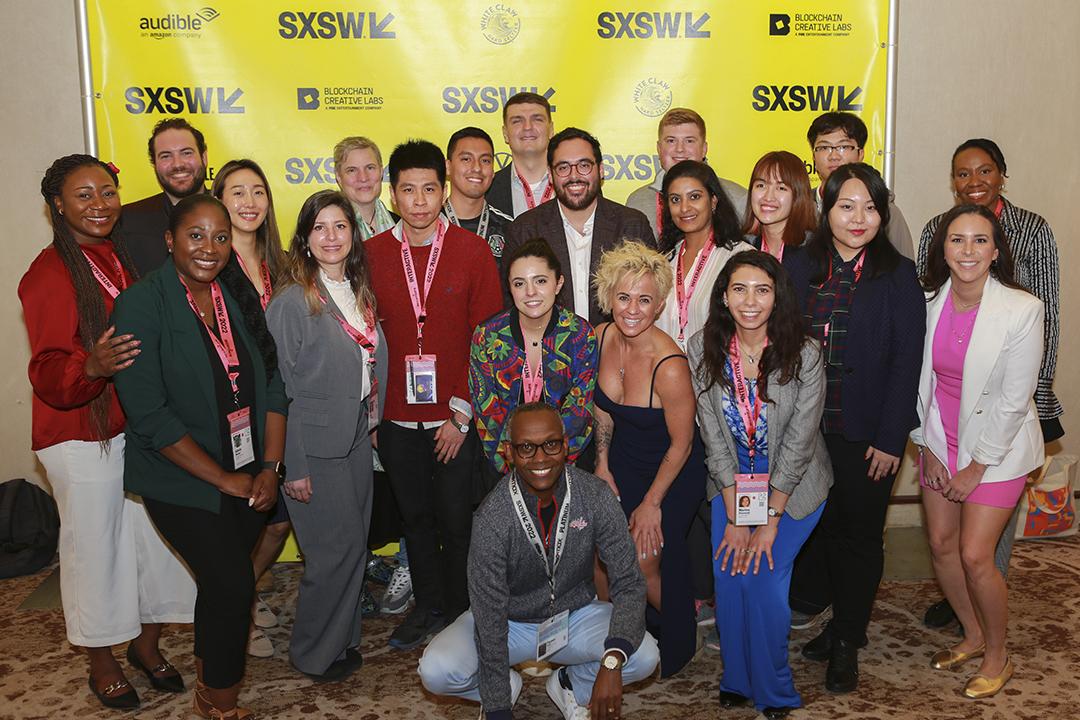2021-2022 Annual Report
A MESSAGE FROM THE DEAN
It has been an energizing year as we returned to the classroom. Looking forward, our priority is to deploy a new strategic plan that accelerates our evolution as a distinctive and distinguished learning and research hub. An ironclad element of the plan is the integration of diversity, equity, inclusion, and accessibility throughout our school and curriculum.
Our strategic roadmap builds on our inherent global strength in international and finance education, but it does not stop there. It enables the School of Business to reshape what our student body can and should represent, to teach sustainable business models and leadership powered by ESG, to create lifelong learning opportunities, and to encourage pioneering research that delivers impact.
Through our reimagined academic offerings, we have gained agility, allowing us to quickly respond to shifting demands in the global marketplace. Our new degree programs, cross-disciplinary certifications, and continued inroads at the intersection of business, STEM, and policy position our students to be competitive in a fast-changing world.
Recruitment, scholarships, and fellowships continue to bring us students who are the best and brightest. We are already the go-to school for women seeking business degrees; our strategic plan will help diversify our enrollment even more. We are confident that students will be drawn to the bold opportunities we provide to learn, not just in the classroom but through overseas projects, mentoring, internships, forums, and hands-on consulting projects. We are also expanding our students’ career pipeline.
Alumni engagement is pivotal to all our work. We are facilitating greater engagement through the launch of the GW Business Forum and the continuation of our George Talks Business podcast, our industry roundtables, and our Community of Practice initiatives in the F. David Fowler Career Center. The programming of our diverse student organizations joins this momentum.
GWSB embraces innovation. And we lead by example. The Penn West Equity and Innovation District in our nation’s capital is a dynamic example. GW is the project’s institutional anchor; GWSB is the natural driver of that collaboration. The launch of the GW Business Forum in 2023 will offer another opportunity for GWSB to shine. This ambitious conference will bring together influential thought leaders and practitioners to examine the ways business, government, policy, and practice can improve the world. Mosaic Insurance Co-founder Mitch Blaser, BBA ’73, is providing pivotal support for the event.
I am grateful for the way the Dean’s Advisory Council and our GWSB community is stepping forward to support our evolution as we prepare leaders who will contribute to the environment, society, and ethical business governance around the world.
Dean Anuj Mehrotra
Commitment to Careers Advances Across the School
Student association leaders, alumni, staff and faculty collectively advanced a banner year for enhanced and new programming in career preparation for undergraduate and graduate students. The F. David Fowler Career Center’s showpiece, the Community of Practice program, unveiled a new finance practice community that gave students non-credit experiential learning through real-life consulting projects. It joins the ongoing — and popular — Community of Practice in Consulting.
“We are giving our students a level of career preparation that they have not experienced before,” said Mark Strassman, the Endowed Blaser Family Executive Director of the F. David Fowler Career Center.
In tandem with the new Community of Practice, the career center brought forward a deeper pipeline of competitive talent and expanded its relationships with high-profile employers in the finance industry. It also stepped up collaboration with employers committed to diversity, equity, inclusion, and accessibility (DEIA). The impact was evident during a robust Diversity Week. Student interest and the broad spectrum of topics requested, caused the program to effectively spill over into two weeks.
DEIA also surfaced as a priority theme throughout the school’s annual Career Week.
The Dean’s Corporate Council also escalated its engagement, providing insight and expertise that shaped curriculum. Council members committed to hiring more GWSB graduates, mentoring students, opening internships, and supporting the school’s fundraising goals.
“Through the Dean’s Corporate Council, we are bringing alumni and major employers into the fold, and they are making an impact. We have changed curriculum based on their input. We are now working to create employer partners whose commitment to being on the Dean’s Corporate Council includes mentoring and hiring our students, whether for internships or for full-time positions. We want employers to better understand who are students are and what they’re capable of.”
Mark Strassman
Endowed Blaser Family Executive Director of the F. David Fowler Career Center
Premier Sports-Career Conference Marks 19th Year at GWSB
More than 200 sports industry executives took part in the school’s nationally recognized Sports Industry Networking and Career (SINC) Conference. Keynote speakers at the February 2022 gathering, which featured both online and in-person events, included DC United President of Business Operations Danita Johnson; ESPN’s Adam Schefter; Jeremy Arnon, the senior business development manager for global sports partnerships at AWS; Don Davis of the NFL Players Association; Gen.G Esports Chief Revenue Officer Martin Kim; and Octagon General Counsel Paul Haase. The conference, organized annually by Associate Professor of Sport Management Lisa Neirotti, connects students and industry professionals for learning, networking, and one-on-one interviews.
Career Week Seeks Out Tech Companies and Employers with Impact
GWSB’s 2021 Career Week showcased a greater number of technology companies while also spotlighting employers that embraced diversity goals and environmental, social, and governance (ESG) principles. A new feature was a series of videos highlighting individual companies’ push for workplace diversity.
“We partnered with employers who empower students and employees in the office environment and who have resources focused on the community and the world at large,” said Brian Citizen, associate director of the Employer Relations Office at the F. David Fowler Career Center. “We wanted to connect with companies that were going to empower students to make an impact.”
Career Week included a job fair, webinars, industry panels, and information sessions.
Diversity Career Roundtable Grows into Diversity Week
The school’s annual February career roundtable on diversity issues mushroomed into a Diversity Week with speakers, research, panel discussions, and student conversations with corporate representatives. The gathering pulled in a strong audience, even after a rise in COVID-19 cases pushed most of its activities onto virtual platforms.
One session focused on LGBTQ+ issues in corporate America while another looked at employment issues affecting Black job candidates. Alumni discussed employee resources and support groups within their companies. And students took advantage of break-out sessions to speak with companies about diversity issues.
One highlight included a presentation—designed and organized by a student—to identify red flags during job interviews that could signal an unwelcoming workplace.
Promotional videos that students created to spotlight their skills and aspirations ran during breaks between events.
Career Center Launches Community of Practice in Finance
Building on its rigorous Community of Practice (CoP) in consulting, the F. David Fowler Career Center unveiled a new program focused on students interested in careers in finance.
The no-credit experiential-learning program drew interest from Goldman Sachs and other high-profile firms, and several students in the first year of the finance CoP landed internships.
Both the new finance CoP and the ongoing CoP in consulting incorporate one-on-one coaching, mentorship, resume review, guidance, and networking opportunities. The most recent CoP in consulting focused on sustainability, assigning students to five pro-bono initiatives with corporate partners. One company, ThinkBox, offered a summer internship to a student on its project.
Milinda Balthrop, associate director of the Community of Practice program, said there are plans to pilot other CoPs.
Peer Coaching Services Expand
Building on their success, two student-to-student coaching programs have ramped up their services. At the same time, the F. David Fowler Career Center streamlined its appointment-scheduling system, causing a notable jump in the number of students benefiting from the center’s services.
The popular Fowler Coordinator Program brought 18 junior and senior coordinators on board to provide coaching for undergraduates, publish a regular newsletter carrying leads on internships and jobs, and offer student-to-student advice on resumes, interviews, time management, and other career-focused issues. The parallel program for graduate students, the Fowler Associate Program, added two additional associates—for a total of five.
Frontline Experiences Shape Third Annual Management Consulting Summit
Presentations on integrative thinking and strategic problem-solving dominated the Management Consulting Summit, where students and alumni networked with high-profile consultants and their clients including Bain & Company, Booz Allen, Gartner, IBM, KPMG, and McKinsey. The Department of Management hosted the annual event.
Anchoring DEIA Throughout GWSB
The School of Business invested in one of its highest priorities, centering diversity, equity, inclusion, and accessibility (DEIA) across its curriculum, policies, events, and even infrastructure. A dynamic roster of work unfolded as DEIA goals were formalized, faculty and staff were provided with accessibility training, and classroom experiences were broadened.
The work paid off in visible ways, including a top ranking recognizing for the second year in a row that the Global MBA program enrolled the highest percentage of women in full-time programs in the United States and a No. 2 ranking on diversity in MBA programs.
“There is a huge demand in terms of students who want an inclusive culture. They want their voices to be heard,” said new Chief Diversity Officer Senay Agca. “There are also more and more employers who want a diverse workplace.
“The future is diverse. As we educate future leaders, DEIA has to be part of it,” she added.
The school boosted scholarship support aimed at a diverse student enrollment, continued a diversity-focused book club, and hosted a number of events, including the career center’s Diversity Week. Students also took part in a case competition focused on diversity issues at IBM.
GW Women in Business, Business Pride Network, and other student organizations played a meaningful role in diversity goals. GWSB supported that work, including through a scholarship collaboration with the National Black MBA Association.
“Diversity and inclusion are like the ocean: always in motion, never stopping. It’s not a single goal that you reach, it’s a journey you remain on.”
Senay Agca
Chief Diversity Officer and Professor of Finance
DEI Speakers Series Kicks Off with Look at Women in Finance
The school unveiled a Distinguished Speakers Series in April, leading with a DEI Council-sponsored presentation on women’s underrepresentation in finance. Michelle Lowry, the TD Bank Professor of Finance at Drexel University, spoke about her research titled What's Good for Women Is Good for Science: Evidence from the American Finance Association.
DEI Case Competition Puts GMBA Knowledge to Work
With help from alumni at IBM, Adjunct Professor of Management Shyam Giridharadas capped an intensive Global MBA course with a case competition focused on diversity and equity. The competition enabled students to apply what they learned to address a real-life challenge at IBM. Teams of judges, among them high-profile representatives from the Latinx, indigenous, Black, and LGBTQ communities, evaluated the students’ work. Some of the judges later contacted the career center to discuss internships and employment.
GWSB Hosts Bioeconomy Workshop with DEIA Component
GWSB convened an invitation-only workshop that brought together academics, business leaders, policymakers, and other public and private sector expertise to explore the challenges and opportunities of bioeconomy innovation hubs. The workshop, Emerging Bioeconomies: Ecosystems and Society, included a panel focused on diversity, equity, and inclusion within the bioeconomy arena. GWSB Chief Diversity Officer and Professor of Finance Senay Agca facilitated that discussion.
Agca also provided the opening remarks at the virtual conference and served as its technical adviser. The January workshop, with support from the National Science Foundation, examined how the bioeconomy ecosystem can spur innovation, entrepreneurship, economic growth, and social wellbeing.
LGBTQ+ Students Lead with Pride
GWSB student leaders continued the momentum to create community and drive the professional development of their LGBTQ+ peers and allies through the Business Pride Network (BPN). Started in 2019 as Out and About, the student organization rebranded itself during the pandemic. Its monthly meetings addressed topics such as workplace culture and mentorship with “out” professionals. GW Women in Business and BPN jointly received GWSB’s outstanding initiative award for their collaboration focused on inclusivity in the workplace.
DC Entrepreneur: New Venture Competition Made the Difference
Anthony Shop, MBA ’11, was interviewed on George Talks Business about how the GW New Venture Competition gave him a leg up in launching his digital marketing company. Shop co-founded Social Driver, named the No. 1 LGBTQ-owned business in D.C. He spoke with GW Today about how authentic leadership empowers members of his team to be themselves.
Senay Agca Named Chief Diversity Officer
As new chief diversity officer, Professor of Finance Senay Agca leads efforts to embed diversity, equity, inclusion, and accessibility strategies at every level within the School of Business. Of the work the school is doing, Agca said, “There is momentum, we are moving fast, but we are not yet where we want to be. We have work to do, but we also have the motivation and energy to do it.”
George Talks Business with Anthony Shop
Presented by the GW School of Business, George Talks Business is a series of 30-minute moderated interviews with notable alumni and respected thought leaders in the business, government and nonprofit arenas.
George Talks Business: The Future of Commercial Spaceflight
Sirisha Bandla, MBA ’15, vice president for government relations and operations of Virgin Galactic, was interviewed on George Talks Business about her July 2021 experience aboard Virgin Galactic’s Unity 22 and the vision for diversity in space travel. She is the third Indian-origin woman to go into space.
“To advance diversity, equity, inclusion, and access in everything we do is one of our strategic goals. We want it at every level of the school — in teaching and research, in onboarding and outboarding, in admissions, in everything.”
Anuj Mehrotra
Dean of the GW School of Business
Elevating Business Leadership Shaped by Ethics and Sustainability
The School of Business deepened its teaching of sustainable business practices by expanding experiential learning opportunities tethered to Environmental, Social, and Governance (ESG) practices; adding an in-demand course on impact investing; bringing a high-profile ESG scholar onto the faculty; and hosting public discussions on ESG in real estate and other sectors.
The research of Joel Gehman, who joined GWSB as the endowed Thaddeus A. Lindner and Sergius Gambal Professor of Business Ethics, as well as that of Assistant Professor of Strategic Policy and Public Management Vikram Bhargava and Associate Research Professor of Strategic Management and Public Policy John Forrer, added to GWSB’s visibility in the ESG arena.
Bhargava looks at how technology issues interplay with ethics and policy. Forrer, who directs the Institute for Corporate Responsibility (ICR), investigates sustainable supply chains, business and peace, and multisector collaborations for governance.
Student projects focused on ESG during the 2021-2022 academic year generated a database of sustainable chocolate brands and an online tool for evaluating sustainable fashion.
“The rise of ESG as a concern across the business community creates opportunities. It could be opportunities for people in their own careers. It could be opportunities around starting new ventures. Understanding how to spot that opportunity and innovate around it is a core part of what you need to know.”
Joel Gehman
Lindner-Gambal Professor of Business Ethics and Professor of Strategic Management and Public Policy
Putting ESG into Practice: GW Chocolate and Sustainable Fashion Gauge
When the GW Chocolate list debuts in fall 2022, it will feature chocolate sellers who use cocoa that travels through sustainable supply chains and avoids the use of forced labor. The list is a student project overseen by Associate Research Professor of Strategic Management and Public Policy John Forrer, director of GW’s Institute for Corporate Responsibility (ICR).
“We want students on our campus and others to know that this is chocolate that has been vetted for labor practices and environmental concerns,” Forrer said.
The list is one of two new ESG projects driven by students. The other, which comes out of a sustainable fashion course taught by Forrer, is an online tool to help students gauge how well they do when it comes to wearing sustainable fashion.
Separately, ICR is working with GW Athletics to identify sustainable athletic wear.
GWSB Students Stand Out at IBESCC
GWSB students grabbed attention at the International Business Ethics and Sustainability Case Competition (IBESCC), which saw students exploring challenges in the fashion and apparel industry. A team combining undergraduate and graduate students Pilar Reyes, Rachael Rusnov, Paul Cornelius, and Sophie Bukrinsky claimed first place for its 10-minute presentation, as well as runner-up awards in its division for two other presentations. Undergraduates Koen Kyer, Kate Young, and Chloe Chu, meanwhile, earned the runner-up award for their sustainability pitch at the competition. Teams were supported by GW-CIBER faculty and staff advisers.
New Course Gives Students Hands-On Experience in Impact Investing
Impact Investing, a new intensive course for MBA and graduate students in international business, allows students to examine the design, finance, and management of projects for companies committed to ESG.
“Students get to look at ways firms can generate important social benefits while also bringing a return on investment,” said Associate Research Professor of Strategic Management and Public Policy John Forrer, who also directs the Institute for Corporate Responsibility at GWSB.
In the first year of the course, students collaborated with DC Green Bank on an impact investment plan to address stormwater resilience in the District of Columbia; with Singapore’s VC Growth Partners to build a business case for putting a beverage bottling production line in the Philippines; and with Uganda-based advisory firm Amani Partners to analyze risk within an impact fund.
Students also learned about projects at the Inter-American Development Bank, World Bank, and other development agencies.
Joel Gehman Deepens GWSB’s Teaching Around ESG
Joel Gehman, whose high-profile research focuses on sustainability practices in business, was named the Thaddeus A. Lindner and Sergius Gambal Professor of Business Ethics. Gehman, a professor of strategic management and public policy, looks at how organizational strategies, technology innovation, and institutional arrangements respond to challenges and changes, including commitment to ESG.
Gehman’s expertise is helping GWSB build its curriculum to address the responsible management of organizations of all kinds. At the same time corporations are embracing ESG principles, students want to be able to evaluate whether potential employers take seriously the issues they care about, including climate change, diversity, equity, and inclusion.
ICR Builds Advisory Council Focused on ESG
The Institute for Corporate Responsibility (ICR) has begun building a council of business leaders with ESG expertise to speak in classes and connect ICR to experiential learning projects that students can work on.
“There is a wide perspective on what ESG is and how we can bring about opportunity to create change,” said ICR Director John Forrer. “The council—we are shooting to have about 20 members—will bring thought leadership that adds to the ESG conversation.”
Extolling Innovation at All Levels
Corporations that stand out from the pack are agile hubs of innovation. GWSB continued its work to develop the next generation of leaders ready to take up that mantle, weaving cutting-edge thinking and practice into its academic programs, its student experience, and its partnerships.
The effort was evident in students’ exemplary performances at the New Venture Competition and other entrepreneurship challenges. GWSB students also stood out in several high-profile business case competitions.
Through the work of the Center for Entrepreneurial Excellence and GW-CIBER, as well as events and public discussions, the school optimized its role as a pulse point for discussions on business innovations and trends. It brought undergraduates into its signature industry roundtables for the first time. And Dean Anuj Mehrotra spoke at the United Nations for Micro-Small and Medium-Enterprise Day as part of a program organized by the International Council for Small Business (ICSB) President and CEO Ayman El Tarabishy, who is a GWSB professor of management.
Responding to the increasingly tech-focused needs of government and other public and private sector entities, the school advanced into its second year of the MBA Security Technology Transition, a collaboration with the Department of Homeland Security, at the same time it took on a pioneering role with the District of Columbia’s Penn West Equity and Innovation District.
“Think about the geopolitical environment we’re working in. The majority of the world’s workforce needs to upskill and reskill to keep up. We are responding to the needs of the future.”
Liesl Riddle
Vice Dean for Strategy; Associate Professor of International Business and International Affairs
Pitch George Catapults GWSB Students to Coveted New Venture Competition
Pitch George, the fall elevator pitch competition to encourage student innovation, and its spring 2022 spinoff, Mini Pitch George, helped carry several GWSB students to the New Venture Competition, the country’s top-rated student entrepreneurship challenge.
The November 2021 Pitch George opened the door for students to present their business concepts, get valuable feedback, win startup capital, and network with established entrepreneurs. It is an example of GWSB’s continued investment in its students.
Initial rounds of the rigorous competition were held virtually; final presentations were in person.
Pitch George, sponsored by the GW Center for Entrepreneurial Excellence, leveraged the faculty’s multidisciplinary expertise to cultivate students’ entrepreneurial spirit and encourage their business ideas.
GWSB Students Win Top Awards at New Venture Competition
GWSB students staked claim to several winning spots in the New Venture Competition, the United States’ top student entrepreneurship challenge. The 2022 competition saw 466 participants and doled out more than half a million dollars in cash and in-kind prizes.
GWSB senior Sabrina Clebnik took the top prize for Best Food and Beverage Venture for her cannabis-infused baking mix brand. She planned to invest her $15,000 prize into a business with her father to put baked goods into cannabis dispensaries in Massachusetts.
Other GWSB students claimed second and third-place prizes in various categories.
The Times of Entrepreneurship in January declared the New Venture Competition the No. 1 university entrepreneurship competition, ahead of Rice University and University of Notre Dame. The competition is a program of GW’s Office of Innovation and Entrepreneurship.
Women in Entrepreneurship Council Launches
The Women's Entrepreneurial Leadership (WEL) Council—made up of GWSB students, including Entrepreneurial Leadership Fellows, and members of the business and professional community—held its first meeting during the spring. It also presented at the GW Women in Business Spring Conference. The council supports a culture of mentorship for student leaders and advises on women’s entrepreneurship activities at the school. It is part of GWSB’s Center for Entrepreneurial Excellence.
STEM MBAs Dovetail with Workforce Needs
With the demand on the rise for executives who understand technology’s value in business management, GWSB built out the programming of its Global STEM MBA and Accelerated STEM MBA. The MBA programs now allow students to add STEM-related certificates to their degree programs in order to deepen their tech management knowledge and make them more competitive in the job market.
The school also continued to offer dual MBA/MS degrees in business analytics and information systems technology, as well as joint MBA/MS degrees in finance and applied finance.
Students in the Master of Science and Information Systems Technology (MSIST) program, meanwhile, can add specialization in additional areas, including managing emerging technology, managing digital organization, cloud application and informational systems, and artificial intelligence.
Dean Mehrotra Speaks at United Nations
To mark the fifth anniversary of Micro-Small and Medium-Enterprise (MSME) Day, Dean Anuj Mehrotra traveled to the United Nations to speak about higher education’s role in encouraging entrepreneurship and small business growth. The dean’s speech was broadcast and archived on UN TV.
The dean joined International Council for Small Business (ICSB) President and CEO Ayman El Tarabishy, the teaching professor of management at GWSB, who served as a facilitator for the day’s events. Professor of International Business and International Affairs Liesl Riddle moderated a UN panel discussion.
The ICSB, which is housed at GWSB, was responsible for drafting the language of the UN resolution that created MSME Day.
DC Innovation District Leverages GWSB Expertise
In an interview on the George Talks Business podcast, D.C. Mayor Muriel Bowser underscored the importance of innovation districts in attracting startups and fast-growing firms to the district. With GW as the anchor institution for a D.C. innovation district currently underway, opportunities are emerging for the School of Business.
“I think we are very excited, of course, by the prospect of the research and the opportunities for our students because of the innovation district and to be in a position to play a role in that at GW,” Dean Anuj Mehrotra said in the podcast with the mayor.
GW anchors the Penn West Equity and Innovation District, which builds on existing expertise in medical technology, government technology, financial technology, and educational technology. Penn West is envisioned as a global destination that unites digital technology with public policy, equity, and social impact, with a cascading benefit for D.C.’s diverse workforce and neighborhoods.
GWSB’s New Venture Competition is being discussed as a contributor to the undertaking.
GWSB Courses and Hot Mommas Project Win Entrepreneurship Award
A GWSB course on women’s entrepreneurial leadership, a separate course on the management of a growing entrepreneurial venture, and the Hot Mommas Project received the Excellence in Entrepreneurship Education Award from the U.S. Association of Small Business and Entrepreneurship. The Hot Mommas Project, a faculty-led tech venture housing the world’s largest women’s case study library, is used in courses at the School of Business.
GWSB Partners with Globant’s Be Kind Tech Fund
Globant is teaming with GWSB to advance the tech company’s venture fund focused on startups that mitigate the misuse and abuse of technology. The academic partnership embraces experiential learning, entrepreneurship, events, and faculty research.
GWSB also continued its platinum sponsorship of the annual Globant Women That Build awards recognizing women in engineering around the world. GWSB judges the awards and offers scholarships to the winners. George Talks Business featured some of the winners on International Women’s Day.
Entrepreneurship Week Marks Third Year
GW Entrepreneurship Week provided guidance, training, and networking for students, alumni, and faculty innovators. The signature event in October 2021 unfolded both in person and online and included research paper submissions and a gala to honor 10 creators with Hippo Awards.
Hacking for Defense
Beginning in the spring 2022, GW students were able to take Hacking for Defense, a course with an entrepreneurial and interdisciplinary approach to solving national security challenges. Read the GW Today article.
Interdisciplinary Collaboration Elevates Skills Sought by Business
GWSB partnered with the School of Engineering and Applied Science (SEAS) to launch new graduate certificates in crisis management, energy systems management and environmental systems management. Dean Anuj Mehrotra said the certificates respond to demand for business leaders with critical engineering and technology skills.
International Study Programs Return, New University Partnerships Forged
The School of Business led the university in reinstating overseas programs and projects. GWSB brought back travel for international consultancies, semester-based study abroad, and graduate capstone projects with companies in other countries. It also introduced the university’s first triple degree program, which enables students to earn three bachelor’s degrees from highly regarded business schools in three countries.
The return to travel came in January when students went to France in a collaboration Grenoble Ecole de Management. Business students also were able to take part in short-term study away programs with partnership universities in Denmark, Ireland, and Mexico.
A full portfolio of international business studies also included the United States’ role, through a DC-based program that examined the U.S. capital at the intersection of policy and business. The program had been designed for online MBA students but it was opened to all graduate students.
Students’ exposure to overseas business and culture was also deepened with the addition of the triple bachelors degree in international business. The ACE degree, which stands for America, China, Europe, is a GWSB collaboration with Renmin University in Beijing and Luiss University in Rome. Students who complete the program in the three global capital cities will have undergraduate degrees in business from all three universities.
“It’s been a busy year for international travel, for domestic travel. The takeaway is that we’re back. Despite all the challenges, even with all the procedures we needed to go through, we found a way to provide international learning experiences for our students. It speaks to the GWSB spirit.”
Bryan Andriano
Assistant Dean of Operations and Global & Experiential Education
GW-CIBER Podcast Offers Global Career Advice
The GW-CIBER Global Careers podcast entered its third year, offering career-building advice from global leaders —many of them GW alumni—at companies around the world.
GW-CIBER Awarded $1.3 Million Grant Renewal
The theme for this grant cycle, which will run through 2026, is Institutions, Resilient, Globalization and Sustainable Competitiveness. Read more in the GW Today article.
Korean Air CEO Looks at the Future of Management
Korean Air CEO Emily Cho and Teaching Professor of Management Ayman El Tarabishy discussed the future of Korean management at an event sponsored by GW’s Korean Management Institute.
New Triple Degree Prepares Global Business Leaders
The School of Business announced a new triple degree—the first at the George Washington University and a rarity in higher education—that merges learning experiences in three global capitals.
The four-year ACE (America, China, Europe) bachelor’s degree in business is designed for students who aspire to be global business leaders. Offered in conjunction with Luiss University in Rome and Renmin University in Beijing, it emphasizes key drivers of management in global business environments. Students work individually and in teams to develop the critical, analytical, and communication skills necessary to work across cultural and business contexts.
After the first year of study, 15 students apiece from GW and the partner institutions form cohorts of 45 for the final three years of the degree. All students spend their second year in Rome and their third year in Beijing before completing the degree together in Washington, D.C.
GW-CIBER Teams Post Success in Case Competitions
GW-CIBER faculty and staff helped guide students to top awards in multiple business case competitions. GWSB students won the graduate division of the annual export strategy case competition organized by the National Association of Small Business International Trade Educators (NASBITE). GW teams also joined the winners’ circle at the International Business Ethics and Sustainability Case Competition (IBESCC), which challenged students to address ethical and sustainability issues in the fashion and apparel industry. A mixed team of GW undergraduates and graduate students took first place for its 10-minute presentation, then came in as a runner-up in the 25-minute and 90-second presentations, while three undergrads were runners-up in their sustainability pitch divisions.
GWSB Students Return to Study Abroad
GWSB restarted its study-abroad experiences for all its students during the 2021-2022 academic year, the first school at GW to resume travel. The renewed overseas programming kicked off in January 2022 in France at the Grenoble École de Management. That was followed by a suite of four short-term programs over spring break and the summer term.
Most of the travel was project based, in partnership with companies overseas. Among other things, students could see what the new post-COVID workplace looked like. Study and project destinations included Denmark and Mexico.
In addition to short-term study abroad, semester-based exchange also returned, with students living and learning at partner universities around the world.
GW-CIBER Offers Nordic Program for Business Faculty Across U.S.
The GW Center for International Business Education and Research (GW-CIBER) organized a faculty development program in Sweden to build awareness of Nordic technology and entrepreneurship. A select group of faculty, predominantly from U.S. universities with underserved student populations and from community colleges, took part in the venture aimed at boosting international business knowledge through direct contact with overseas companies.
The program was designed to provide experiences beneficial to teaching and research. Site visits focused on sustainable fashion, renewable energy, edtech, and green steel.
Scandinavia is home to prominent companies known for innovation. Stockholm, in particular, is second only to Silicon Valley for the number of billion-dollar tech companies—unicorns—per capita, and the density of startups in Sweden is four times higher than that of the United States. The GW-CIBER program in June included visits to Ericsson Imagine Lab, the Royal Technical University, Norrsken Foundation, Arctic Business Incubator, Node Pole, Swedish Institute, Business Sweden, and several startups.
Community Engagement Grows at GWSB
GWSB’s alumni gave back in high-impact ways during the 2021-2022 academic year. Their robust philanthropy led all schools during the university’s April 6 Giving Day. They also gave of their time and expertise by speaking to classes, mentoring students, partnering on experiential learning projects, serving on advisory panels, and opening up internships and job opportunities.
The virtual platforms that snapped into place during the pandemic and the hybrid environments that followed emerged as powerful tools in connecting and reconnecting alumni to the school, its students, and the lifelong learning offerings propelled by the school’s new strategic plan.
“Alumni engagement puts students in touch with businesses and internships and with professional networks. It improves our students’ marketability,” said Christine Brown-Quinn, MBA ’92, outgoing president of the GW Alumni Association Executive Committee and a member of the School of Business Board of Advisors.
Quinn-Brown pointed to the school’s role in the Penn West Equity and Innovation District as an example of GWSB’s capacity to advance innovative public initiatives while showcasing students’ readiness to contribute to high-impact entrepreneurial initiatives.
"One of the biggest strengths at the school is where we’re going with innovation and entrepreneurship. The linkage you see in the world right now is more independent contractors, more entrepreneurial ventures, more innovation — and it is all so important to progress around the world. To know that the GW School of Business provides that kind of foundation is powerful."
LaJuanna Russell (MBA '98)
President & CEO, Business Management Associates, Inc. Member, GWSB Board of Advisors
D.C. student selected for high-impact scholarship
The reach of the School of Business may be global, but it also has an eye on its own backyard. Among the talent in the upcoming undergraduate class of 2024 is a D.C. resident ready to leave her mark on her community.
Thurgood Marshall Academy student Cierra James is one of 10 D.C. students—among 145 nominees in the nation’s capital—to receive a Stephen Joel Trachtenberg Scholarship covering the full cost of a GW degree. She plans to use the scholarship for a business degree.
The coveted Trachtenberg Scholarships focus on D.C. students with high academic performance, leadership skills, community service, achievements and a likelihood of making an impact in their community.
GWSB Alumni Power Giving Day Success
Generous School of Business alumni and friends stepped forward to drive the university over the $1 million goal during GW’s second annual Giving Day for student financial aid, infrastructure, and other areas of need. One of the most significant commitments leading up to the April 6 fundraiser came from Ave Tucker, BBA ’77, who agreed to match up to $350,000 in donations.
GW Alumni Association President Christine Brown-Quinn, MBA ’92, and her husband also provided key support for graduate students: $25,000 in a GWAA Executive Board match and $25,000 to match the School of Business Dean’s Board of Advisors.
Quinn Fellows Fund Supports International Business Internships
GWSB Board of Advisors member Michael S. Quinn, BA ’84, continued his generous support of the school with $3,000 awards to help with expenses for students in international business internships. GW-CIBER administers the Quinn Fellows Fund.
Military Students and Alumni Network at GWSB Event
A November 2021 reception offered students and alumni with military service an opportunity to network. Lourdes Tiglao (MBA ’14), director of the Center for Women Veterans at the U.S. Department of Veterans Affairs, headlined the event.
Alumnus Accelerates Bid for Prominence in Real Estate Programming
GW Trustee Charlie Bendit, BBA ’75, provided the lead gift in a $2 million campaign to spur GWSB to the forefront of real estate education. Bendit is co-CEO of Taconic Partners and one of CREUA’s founding advisory board members.
Industry Roundtables Open Up to All GWSB Students
Industry roundtables continued to bring students together with business leaders and recruiters, but the 2021-2022 academic year saw a significant change: GWSB for the first time opened roundtables to undergraduates. Initially an MBA signature event, the school extended the program which has enabled graduate students to meet business leaders four times a year for in-depth discussions about industries, business trends, and career opportunities. Undergraduates now will have two opportunities a year to join roundtables. The gatherings are a favorite of alumni and, over the years, have helped many students make long-term connections and land internships and jobs.
George Talks Business Hosts Washington, D.C. Mayor
The George Talks Business series continued its interviews with high-profile leaders, including D.C. Mayor Muriel Bowser, who discussed plans to attract businesses to the nation’s capital. GW Today covered the interview.
GWSB Is Forum for Women in Business Education Conference
The GW School of Business hosted the two-day Women in Business Education (WiBE) Conference, which brought together senior academic women from around the globe. A half-day workshop following the official conference enabled participants to explore leadership creativity and innovation. WiBE seeks to build greater diversity and gender balance at all leadership levels within business schools. GW alumna Lisa Leander is the organization’s founder and president.
In Memoriam: Professor Yoon S. Park
Yoon S. Park, the son of South Korean farmers, used his intellect to carve out a career in international finance, including more than two decades teaching at the School of Business.
Before joining academia, Dr. Park held several high-profile positions, including as a senior economist at the World Bank and a financial advisor at Samsung Group. He sat on the boards of Samsung and the Korea Economic Institute of America and was president of the Korea Economic Society. He authored books on financial crisis, financial reforms, corporate governance, and accounting standards.
He held a master’s degree and PhD, both in economics, from GW, a DBA in finance from Harvard University, and two degrees from Kyung Hee University.
Dr. Park died on March 10, 2022. He was 81.
GWSB Partners with National Black MBA Association
GWSB formalized a new partnership with the National Black MBA Association (NBMBAA) anchored by at least $25,000 annually in GWSB scholarship funds for an MBA student. As a platinum ally in the association’s Collegiate Partnership Program, GWSB will also subsidize the participation of at least 10 students at the NBMBAA national conference and career fair.
GWSB sent a student team to the organization’s graduate case competition in the 2021-2022 academic year and will continue to do so going forward.
“As part of the benefits, this allows our students the opportunity to be part of a larger network beyond the GW School of Business,” said Brittany Johnson, program manager in the Office of Graduate Programs and an adviser of the GWSB student group. “The partnership connects our students to the local MBA Chapter in the D.C. area, as well as the national organization—opening students to additional financial assistance, recruiting events, and chats with corporations.”
To take advantage of the benefits of the partnership, students must belong to the DC Chapter of the NBMBAA, which is active on campus. As part of the partnership, GWSB students joined D.C. chapter members from American, Georgetown, and Howard universities for a networking event.
Johnson said the new partnership supports GWSB’s diversity, equity, and inclusion goals.
GWSB and Women in Bio Prepare Women for the Boardroom
The School of Business continued its partnership with Women in Bio, providing a board certification curriculum and two-and-a-half days of coursework at an annual event designed to fuel women’s participation on corporate boards in the life sciences.
Women in Bio, which focuses on the career development of women in biopharma and the life sciences, selected a cohort of 25 top-tier business women for the two-day Boardroom Ready workshop hosted virtually by GWSB. Led by Susan Kulp, professor of accountancy and director of the Global MBA program, the intensive training, networking opportunities, and mentorship aim to increase women’s preparedness for service on both public and private boards.
Homeland Security Partnership Completes First Year
The School of Business completed its first year as a Center of Excellence in Security Technology Transition, a partnership with the U.S. Department of Homeland Security (DHS) to build the national security workforce. Through the five-year partnership, GWSB offers a Security Technical Transition MBA for government and private sector employees in the security technologies arena.
Centers of Excellence work with industry, DHS, first responders, and federal, state, and local government agencies. To support the degree program and partnership, the GW Business Center of Excellence in Security Technology Transition set up an advisory council that includes GW alumni.
Finance Educational Partnership for Local Impact
The D.C. Department of Insurance, Securities and Banking (DISB), led by GWSB alumna, Commissioner Karima Woods (MBA 2011), announced their new partnership with GW Business. “Partnership with DISB’s Financial Academy provides our students with the opportunity to apply lessons learned in the classroom to solve real-world problems in our Washington, D.C., neighborhood,” said Vice Dean for Strategy, Liesl Riddle. Read more about the partnership in the Washington Informer article.
GWSB Scales Up Innovative Research
Dynamic research with impact and relevance influenced both the academy and the business world, with faculty pushing forward on work that is distinguishing the GW School of Business. The work included collaborative research that drew the attention of both academic journals and news media.
“Great efforts have been made to provide an academic environment that encourages GW School of Business faculty to conduct and produce cutting-edge research,” said Vice Dean for Faculty and Research Jaiwen Yang.
Faculty deepened the School of Business’s research imprint by moving forward in areas where GWSB has long distinguished itself — international business, finance, management and information systems — while adding new groundbreaking findings on single women in corporations, the use of artificial intelligence in marketing, the ability of mathematical models to protect the power grid, and the effectiveness of financial literacy programs.
GWSB research appears in top academic journals, at the same time faculty members are being lauded for their work through international, national, and university awards. Respected lists of the most-cited academic researchers include GWSB faculty. And several faculty in the school are editors of prestigious scholarly journals.
Faculty members are also in demand by media for their expert analysis, underscoring the real-time relevancy of their research on such wide-ranging issues as oil prices, the labor market, and the impact of the war in Ukraine.
"Our faculty has achieved greater prominence in research quality and productivity, as shown by the increasing number of publications in top-quality scholarly journals. I strongly believe that this trend is gaining momentum for the years to come."
Jiawen Yang
Vice Dean for Faculty and Research
Faculty Tapped for Insight on War in Ukraine
Professor of International Affairs and of International Business Scheherazade Rehman, who also directs the European Union Research Center, emerged as a leading global resource on the war in Ukraine, offering insight on threats to NATO countries, cyber warfare—including masked ransomware, and other scenarios. She described the implications of Russia’s actions as Cold War 2.0.
- International Business Professor Robert Weiner, who is also a professor of public policy and of public administration, looked at whether oil companies took advantage of the war by hiking prices. He also examined the idea of oil as a “stranded asset.”
- Associate Research Professor of Strategic Management and Public Policy John Forrer, who directs the Institute for Corporate Responsibility, offered proactive strategies to help businesses prepare for international conflicts.
- Hochberg Professorial Fellow of Leadership Development and Professor of Management James Bailey shared his perspective on the war and on companies shutting down operations in Russia. He provided insight on ways social media influenced beliefs about the war.
- Noel Maurer, associate professor of international affairs and international business, spoke with Insider about U.S. involvement in the conflict, citing similarities to the Cold War. He also held a virtual public discussion on the war’s consequences.
Marketing Research Looks at Consumer Interaction with the Internet
Louis Rosenfield Distinguished Scholar Donna Hoffman and Denit Trust Distinguished Scholar Thomas Novak have deepened the school’s involvement in how the internet influences marketing and consumer behavior.
The two professors of marketing are co-directors of the GW Center for the Connected Consumer, and they have co-authored multiple papers and book chapters. Their article, “Consumer and Object Experience in the Internet of Things: An Assemblage Theory Approach,” published in the Journal of Consumer Research, was selected as the winner of the journal’s 2021 Best Article Award.
The Stanford Citation Study lists Hoffman among the top 2 percent of scholars in her field, based in part on academic journal citations. Research.com also ranks her among top scholars.
In addition to her academic writing, Hoffman is quoted in consumer media. In a recent article, she discussed consumer buying patterns amid a changing economy. The AP and The Hill tapped her expertise on the future of digital services in a post-COVID world.
Novak’s research focuses heavily on consumer behavior in online environments and digital marketing.
Corporate Hierarchy: Single Women Face Advancement Penalties
Studies long have shown how stubborn stereotypes about working mothers stymie their corporate leadership aspirations. Associate Professor of Strategic Management and Public Policy Jennifer Merluzzi has added vanguard research that shows the obstacles are even greater for single women aiming for the C-Suite.
Merluzzi, who was named senior editor of Organization Science, has gained widespread attention for her studies of single women who possess the high analytical skills that are valued in top leadership roles. Her research on young, single women in corporations extends the notion of a motherhood penalty.
A Washington Post article reported on her findings that corporate hierarchies penalize single female MBA graduates even more than women with families or single, unmarried men. Psychology Today cited her work in a column about why women are bypassed for promotion.
The GW School of Business is one of only two U.S. educational institutions where a majority of full-time MBA participants are women.
Top Scholar Researches Star Performers
Professor of Management Herman Aguinis, the Avram Tucker Distinguished Scholar and chair of the Department of Management, continued his much-cited research on business leadership and star performance, as well as domestic and international workforce diversity, staffing, training and development, and performance management. He served as president and program chair of the prestigious Academy of Management during 2021-2022. The fifth edition of his book Performance Management will be published in 2023.
Aguinis is ranked among the most influential economics and business researchers. He is one of the most-cited scholars, according to Clarivate and the Stanford List, which spotlights the top 2 percent of most-cited scholars in several disciplines. Research.com ranks him among the top business and management scientists.
Aguinis recently co-authored papers on management, staff, and management research in the Journal of Management, Academy of Management of Perspectives, Business Horizons, Business & Society, as well as papers on innovative methodological approaches for developing and testing theories in the Journal of Management Studies and Human Relations. He has served on the editorial boards of more than two dozen academic journals.
Research Tracks Evolution of Artificial Intelligence
Visiting Assistant Professor of Decision Sciences Patrick Hall advanced understanding of technology risk management with a focus on the nascent field of artificial intelligence (AI). His work includes policy and regulation of AI—from municipal laws to international treaties—and social bias within AI.
He is a frequent contributor to academic journals and reports. Recent work included a National Institute of Standards and Technology report on managing bias in AI and a Frontiers in Artificial Intelligence paper on machine learning and fair lending laws. He is a co-author of the book Machine Learning for High-Risk Applications, which is scheduled for release in February 2023.
In June, Hall presented at a National Academies symposium that looked at the latest developments in artificial intelligence and machine learning. He also authored a blog for the Open Science Data Conference (ODSC) on scientific methods that lead to bias problems and AI system failures and an article in the ABA Journal on things lawyers should know about AI.
Hall sits on the advisory board of the AI Incident Database.
NSF Grant Unleashes New Tool for Protecting Power Grids
Threats to U.S. power grids — from extreme weather, aging infrastructure, cyberattacks, and even terrorism — are a concern of the government, the military, and private business, including the health care system. Professor of Decision Sciences Miguel Lejeune was awarded a three-year, $360,000 National Science Foundation grant to investigate whether an analysis optimization model can be used as a tool to improve the reliability of power-generating networks.
Using mathematical formulas, Lejeune’s high-profile work could identify weaknesses in the power grid as well as where and how mobile power generators might be quickly dispatched to offset unexpected outages. Mathematical analysis might also determine how many and what types of mobile power sources are needed.
The NSF grant is one of several Lejeune has received for his work, which applies mathematics, analytics, and optimization models to assess and mitigate risk in operations management, including in finance and supply chains.
Energy Sector Expertise at Critical Time
Robert Weiner, a professor of international business, of international affairs, and of public policy and public administration, was tapped by both academic journals and the media during the 2021-2022 academic year for his knowledge on fast-moving energy industry developments, including the rise of oil prices and the impact of the war in Ukraine.
Weiner co-authored papers in the Journal of International Business Studies on investor reactions to news events and sovereign wealth funds and geopolitics. He was also quoted in multiple news stories. For example, he was sought for his expertise by The Hill, including in an article on Biden administration efforts to lower gas prices, and he was interviewed by Al Jazeera about the U.S. ban on Russian oil.
Weiner’s research areas encompass energy security, oil and conflict, energy crises, resource nationalism, and U.S.-Chinese competition for oil. In addition to his teaching roles at GWSB and the Elliott School of International Affairs, he is associate director of the Global and Entrepreneurial Finance Research Institute, a GW-chartered research center.
One Year, Two Olympics
During a year-long period that saw two Olympic Games and Paralympic events, Associate Professor of Sports Management Lisa Delpy Neirotti was the go-to source for media around the world.
Neirotti, one of the foremost experts on the business of the Olympic Games, was featured in dozens of media reports during the 2022 Winter Games in Beijing and the Tokyo Summer Games, held in 2021 owing to the COVID-19 pandemic.
Voice of America interviewed her about human rights and the China games. CGTN America featured her in a report on sports diplomacy. And Forbes asked her about the games’ breakout stars. She talked to the Christian Science Monitor about the boycott of the games.
While she is best-known for her work with the Olympics, Forbes also tapped her insight on the Super Bowl and the NFL while Marketplace asked her, “How Lucrative is Ice Skating?” She spoke to The Washington Times, MSN, FanNation, television outlets, and other news outlets about the Washington Commanders. Reporters also sought her expertise on pay equity for women in soccer.
Management Professor Examines Return-to-Work Resistance After Pandemic
Professor of Management James Bailey, the Hochberg Professorial Fellow of Leadership Development, built on his research about the effects of remote working to explore the reluctance of employees to return to the office after the COVID-19 pandemic.
Bailey and Professor of International Affairs and of International Business Scheherazade Rehman, who also directs the European Union Research Center and is the GW Deans Professorial Fellow of International Finance, co-authored the Harvard Business Review article titled “How to Overcome Return-to-Office Resistance.” The HBR article was also spotlighted in a Spotify podcast.
Bailey and Rehman found that while the pandemic has been a once-in-a-century disruption to business, managing resistance to returning to the workplace was no different than managing any other kind of organizational change.
Bailey also co-authored the International Business Times article “Hypersensitivity And The Return To Work: Post-COVID Anxiety, Uncertainty And Irritability,” with Anca Alexandrescu, a branch manager for the Department of Homeland Security and an MBA student at GWSB.
In an article for Fast Company, Bailey looked at “The hidden reason people don’t want to go back to the office.” In a second article in Fast Company, Bailey examined how each generation felt about returning to workplace after the pandemic. He was cited on the same theme in an article in Out Of Office.
The Guardian cited James in its article “Offices and schools about to reopen–but will commuters return?’’ He was also quoted in an INC Magazine article.
GFLEC Studies Sound Alarm on U.S. Financial Literacy
The Global Financial Literacy Excellence Center (GFLEC) celebrated its 10th anniversary with a spate of new research, including a metanalysis showing that tailored financial education programs can be both effective and low-cost. Annamaria Lusardi, GFLEC’s founder and academic director, received the Money Awareness and Inclusion Awards (MAIA) for Best Academic Paper for the work, which will appear in the Journal of Financial Economics.
Lusardi wrote widely about her research findings over the past year, including how COVID-19 exacerbated financial disparities, particularly for women and minority populations.
Other notable findings emerged from the TIAA Institute-GFLEC Personal Finance Index, the annual gauge of financial literacy. The latest index found the United States losing ground. Too few people understand the money-management concepts needed for financial security and resilience.
Clarivate identified Lusardi, the University Professor of Economics and Accountancy at GW, as a “highly cited researcher.” She is frequently quoted in the New York Times and she writes columns for Forbes and The Financial Times. Her work shapes financial education policy and programs.
Student Initiative and Leadership Drive Events, Activities, Career-Building Opportunities
The full return to campus unleashed the pent-up energy of undergraduates anxious to maximize their GWSB experience. Student took advantage of a full roster of offerings through the Office of Undergraduate Programs — often in collaboration with other units in the school — including industry roundtables, business case competitions, and networking opportunities.
Graduate students, too, took advantage of back-on-campus opportunities.
“We were able to maintain goals and accommodate blended approaches as students returned to campus and were able to engage again,” said Brittany Johnson, program manager of the Office of Graduate Programs. “The Global MBA class, for example, had great experiences with their faculty members. They were engaged, taking on more dual degrees, and adding more courses from the STEM curriculum.”
A highlight of the year was the expansion of the Business Leader Development program, which prepares students for internships and full-time employment.
The undergraduate experience also benefited from the students themselves. The Undergraduate Business Association, which advocates on behalf of the 23 undergraduate student organizations at GWSB, was especially active.
At the same time, hundreds of students and business professionals took part in the GWWIB spring conference, the student group’s most ambitious event each year. It included industry panels, professional development workshops, and networking opportunities.
Other student-led conferences included Ready. Set. Grow., which was organized by students in professional fraternities Alpha Kappa Psi and Delta Sigma Pi in collaboration with the F. David Fowler Career Center and the GW Development and Alumni Relations Office. The Data Club — focused on data science and data analytics — held a virtual Data-Driven Insights Conference, featuring Santander Chief Data Office Rakshit Kapoor and the chief science officer at DataPrime, Kirk Borne.
"The students really demonstrated an outstanding level of resilience and really continued making the best of the year as they persevered through a variety of changes and the return-to-campus experience. We saw outstanding levels of student engagement across programs and events. We saw strong levels of engagement in undergraduate student organizations and stellar leadership from those organizations. "
Ryan LLoyd
Assistant Director, Co-Curricular Learning, Office of Undergraduate Programs
"Students were happy to be back in the classroom setting, to have the opportunity to participate in person and connect with each other while also learning to manage connections with those who weren’t able to return. Technology allowed us to create and bridge new hybrid experiences."
Brittany Johnson
Program Manager, Office of Graduate Programs
Students Add to Learning Through Case Competitions
GWSB undergraduate students connected with several case competitions, taking advantage of coaching support from the Office of Undergraduate Programs.
A team of MBA students finished in first place in the Marketing Case Competition hosted by the McDonough Business School at Georgetown University. The GWSB team delivered an innovation and communication plan to help Band-Aid Brand Adhesive Bandages better resonate with younger and more diverse consumers. A GWSB team claimed second place in its bracket and picked up accolades for its team video at the McDonough School of Business case competition focused on sustainability.
A GWSB team was among 114 that competed at the McGill International Portfolio Challenge in Montreal, and GW School of Business was represented at the American Marketing Association Collegiate Case Competition, which unfolded over a year and drew 100 teams. Meanwhile, two undergraduates went to the semifinals of the Texas Christian University Neeley School of Business Values and Ventures Case Competition.
Through an ongoing partnership with Deloitte — the Deloitte Core Consulting Series — graduate and undergraduate students learned about management consulting then took part in case competition presentations to Deloitte professionals and GWSB alumni.
With support from GW-CIBER, student teams from the School of Business made strong showings at the International Business Ethics and Sustainability Case Competition hosted by Loyola Marymount and at the International Case Competition organized by the National Association of Small Business International Trade Educators.
Business Leader Development Program Hits Full Stride
The Business Leader Development (BLD) Program marked the first complete year during which a full suite of courses were offered to equip undergraduates to be forward thinking, strategic about their careers, and focused on leadership skills.
The program, a requirement for Bachelor of Science programs, has expanded sequentially from its first-year development courses to include a transfer-student course, a career strategy course and, now, the Business Leader Launch. Business Leader Launch channels the lessons of previous courses into an experiential learning opportunity.
Students in the Business Leader Launch work in an internship, serve as a BLD student mentor, conduct research with a faculty member, serve in a top leadership role at a GWSB student organization, or engage in a community project in the greater D.C. area.
The BLD program was launched by the Office of Undergraduate Programs in collaboration with the F. David Fowler Career Center.
Undergraduate Business Association Steps Up Its Activities
The Undergraduate Business Association (UBA), the umbrella for the school’s 23 undergraduate student organizations, was active during the 2021-2022 academic year, speaking before the GWSB Board of Advisors to advocate on behalf of student groups and facilitating a number of events.
The UBA organized a welcome activity at the start of the school year, a study-break event at midterm, a salary-negotiation session, and a daylong activity with the GWSB administration that included mock job interviews. As in past years, it also hosted Into the Industry career conferences in March and February, drawing more than 500 attendees. Into the Industry allows students to explore business areas that might interest them. The conferences featured eight panels of industry professionals — from international business leaders to consultants to finance executives — and 34 speakers.
The UBA also continued its participation with the GWSB Ambassadors Program, a partnership with the Undergraduate Admissions Office and Office of Undergraduate Programs to provide student tour guides to escort prospective student and their families. More than 300 individuals took advantage of the 20 tours during the 2021-2022 academic year. UBA also collaborated on eight lunch discussions with mock business case analyses for prospective students.
GW-CIBER Bootcamp Puts Down Deeper Roots
For a third year, GW-CIBER held its nearly month-long International Business Bootcamp to deepen students’ practical understanding of global business and trade. The camp was launched during COVID-19 to provide a learning experience at a time when students could not travel for projects. It proved so popular that it has continued as a multifaceted co-curricular program.
The bootcamp that kicked off in March 22 featured webinars and guest speakers. It focused on four areas of international trade—global business management, global marketing, supply chain management, and trade finance—that anchor the top international business professional certification, the Certified Global Business Professional (CGBP). Students who acquire CGBP certification after the bootcamp have their exam fee reimbursed.
The bootcamp, which adds to undergraduate and graduate students’ preparation for internships and jobs, complements traditional courses in international business, international trade, international economics, and related areas. Recent graduates of GWSB are also eligible to apply for the bootcamp.
GWiB Hosts 13th Annual Conference
Tamika Tremaglio, executive director of the National Basketball Players Association, provided the keynote address for the GW Women in Business (GWWIB) spring conference, which brought together 175 attendees and dozens of speakers — more than half of them alumni.
The annual event by one of the school’s most active student-run organizations featured two speaker series. One looked at sustainability in the corporate world and the other spotlighted women in male-dominated industries.
The April conference was supported by the Office of Undergraduate Programs, the F. David Fowler Career Center, and the Office of Development and Alumni Relations. It also had strong support from the GWSB Board of Advisors.
Students Spearhead Networking Career Treks
Student organizations organized a series of career networking treks, both virtual and in-person, that providing opportunities for students to make valuable professional connections as a prelude to internships and jobs in career fields.
The GW-wide Women in Finance Alliance held a virtual New York City trek that involved 11 companies, while GW Women in Business (GWWIB), the school’s largest women-led student organization, hosted a fall career trek that enabled students to engage with 40 industry professionals, including executives from BlackRock, Salesforce, TikTok, LinkedIn, and Google.
Career treks allow small groups of students to explore an area of business or a specific industry in more detail. Recruiting opportunities also made available during the treks, which additionally provide networking opportunities with GWSB alumni.
Professional co-ed business fraternity Alpha Kappa Psi hosted a spring trip that included visits with Elevation Gained and Bloomberg. The Tamid Group, focused on Israeli business, held a career trek with six guest speakers across industries.
GWSB Hosts Program to Build Business Language Proficiency
GW-CIBER continued the expansion of its Business Language Case Clearinghouse, accepting a new summer cohort of students from across the country and putting them through its rigorous program, which includes in-class debates and assignments designed to build business-language proficiency in cultures that are not their own.
The business case studies written by students in the program were added to the clearinghouse, which already includes papers addressing issues related to doing business in Arabic, Chinese, French, German, Italian, Japanese, Portuguese, and other languages. Cases in the clearinghouse are free to download and use
Consulting Abroad Program Takes Students to Istanbul, Berlin, Dubai
International travel associated with the Consulting Abroad Program (CAP) for Global MBA students resumed, and the spring 2022 program took students to Turkey, Germany, and the United Arab Emirates. The students’ overseas projects included work on both corporate challenges and social impact initiatives.
During the COVID-19 pandemic when global travel came to a halt, CAP students continued experiential learning through projects and meetings with global companies via online platforms. The 2021-2022 academic year marked a return to site visits and face-to-face meetings with project partners in other countries.
First-year Global MBA students are required to take CAP in order to apply what they learn in the classroom to real-life situations. Students work in small teams, attend lectures, meet with local executives, and prepare project reviews and recommendations. Their residencies also expose them to local history and culture and networking with overseas alumni.
In Istanbul, for example, students worked business challenges for BlinkLook, a social enterprise that develops products and services for people who are visually impaired; renewable energy company EkoRE; digital bank Enpara.com; digital gaming firm Ozan SuperApp; and RedRose, which connects humanitarian initiatives to technology aimed at transparency and accountability.
The Berlin projects ranged from work with DGLegacy, which protects consumers’ digital, financial, and physical assets, to nonprofit MiCT, which trains media professionals. In Dubai, GWSB’s corporate partners included Marriott International, Solico Composites, and Damas jewelers.
Graduate Students Present at SXSW in Austin
Graduate students in the new Business & Society: Startup Resilience course, a summer study-away opportunity focused on entrepreneurial ecosystems, traveled to Austin, Texas, to speak at the SXSW conference. The high-profile conference, now in its 35th year, celebrates the cross-pollination of innovation and technology.
As part of the course designed by Thomas Debass, managing director of the Office for Global Partnerships at the U.S. Department of State and an adjunct professor at GWSB, students collaborated on entrepreneurial ventures focused on U.S. urban areas. While at the SXSW conference, they were invited to offer a presentation on their experience.
The students also joined several dozen alumni at an Austin reception organized by the School of Business.


